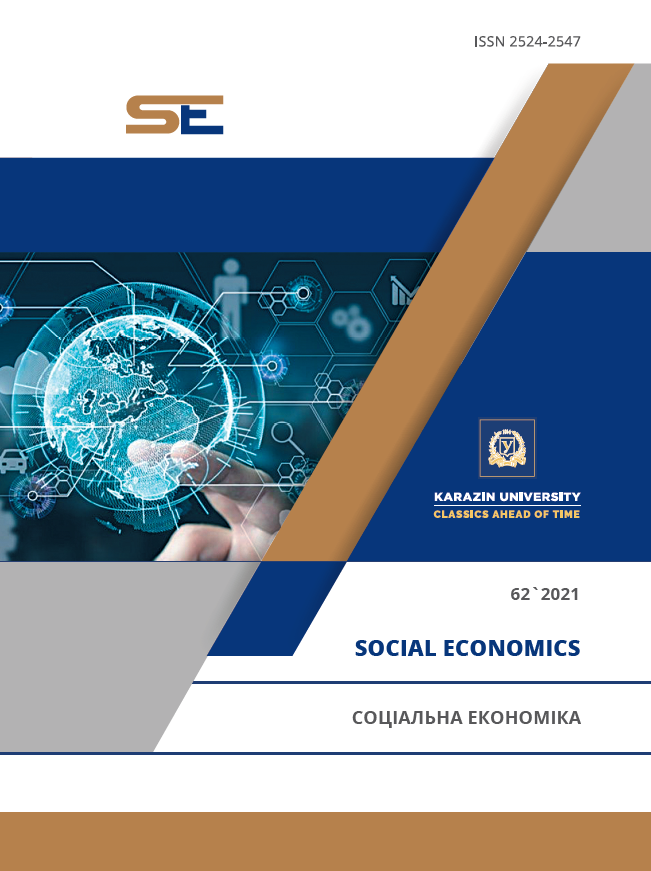THEORETICAL AND METHODOLOGICAL ASPECTS OF POPULATION POVERTY MEASUREMENT AS AN INDICATOR OF SOCIAL POLICY EFFICIENCY
Abstract
Exacerbation of socio-economic challenges necessitates the assessment of the effectiveness of the social policy, and one of the indicators of which is the level of poverty. This highlights the feasibility of comparing existing methodological approaches to measuring poverty, substantiating their objectivity and the feasibility of using it to assess the effectiveness of the national social policy. The results of the study revealed the diversity of existing approaches to the definition of ‘poverty’, which combines economic, social, and political aspects; the existing approaches and criteria for determining poverty are summarized. The paper specifies the methodological features of assessing the scale of poverty within an objective approach to 1) monetary criteria (absolute and relative poverty line, other monetary limits in accordance with the methodology of the World Bank and the EU), 2) non-monetary poverty line (based on identifying multiple derivations deprivation). The author’s position is that the assessment of the extent of poverty should also be carried out within the framework of a subjective approach, which involves self-identification and self-assessment of their own standard of living (according to the survey).
The analytical study of trends and scales of poverty according to all methodological approaches and criteria for its definition is carried out. The novelty of this study is to identify trends and the overall level of effectiveness of national social policy in terms of all indicators of poverty. According to the results of comparative analysis of poverty indicators, the author's position on the objectivity of their reflection of the level of effectiveness of national policy is substantiated, the advantages, disadvantages, expediency and reservations on the application of existing methodological approaches to determining poverty to assess the effectiveness of the social policy.
Downloads
References
Smith, A. (1776). An Inquiry into the Nature and Causes of the Wealth of Nations. Retrieved from http://www.econlib.org/library/Smith/smWN.html.
Bentham, J. (1781). An Introduction to the Principles of Morals and Legislation. Retrieved from http://www.utilitarianism.com/jeremy-bentham/index.html.
Pareto, V. (1997). Compendium in General Sociology. Anthology of world political thought. Moscow. Vols. 1. (in Russian)
Booth, C. (1893). Life and Labour of the People in London. Journal of the royal statistical society. Retrieved from https://www.jstor.org/stable/2979431.
Proudhon, P.-J. (1846). Système des contradictions économiques ou Philosophie de la misère. Retrieved from http://surl.li/arrci.
Toffler, E., & Toffler, Н. (2008). Revolutionary wealth: How it will be created and how it will change our lives? (M. Sultanovoi, N. Tsyrkun, Trans). Moscow: AST. (in Russian)
Hine, D., & Montiel, C. (1999). Poverty in developing nations: a cross-cultural attributional analysis. European Journal of Social Psychology, 7, 943–959.
Hobson, J. (2004). Problems of Poverty. An Inquiry into the Industrial Condition of The Poor. Blackmask, 6, 366-372.
Banerdzhi, A., & Duflo, E. (2018). Poverty economy. How to free the world from poverty (V. Plyskina, Trans). Kyiv: Our format. рр. 312-320.
Jolliffe, D., & Prydz, E. B. (2016). Estimating international poverty lines from comparable national thresholds. The Journal of Economic Inequality, 14, 185-198. doi: https://doi.org/10.1007/s10888-016-9327-5.
Ahrendt, D., Sándor, E., Revello, А., Jungblut, J-M., & Anderson, R. (2014) In-work poverty in the EU. Retrieved from http://surl.li/arrly.
Herman, E. (2014). Working Poverty in the European Union and its Main Determinants: an Empirical Analysis. Engineering Economics, 25(4), 427-436. doi: https://doi.org/10.5755/j01.ee.25.4.6339.
Sen, A. (1999). Development as Freedom. New York: Alfred A. Knopf. 366 p.
Mood, C., & Jonsson, J. O. (2016) The Social Consequences of Poverty: An Empirical Test on Longitudinal Data. Social Indicators Research, 127, 633-652. doi: https://doi.org/10.1007/s11205-015-0983-9.
Nakabashi, L. (2018). Poverty and economic development: Evidence for the Brazilian states. EconomiA, 19, 445-458. doi: https://doi.org/10.1016/j.econ.2018.11.002.
Škare, M., & Pržiklas Družeta, R. (2016). Poverty and economic growth: a review. doi: https://doi.org/10.3846/ 20294913. 2015.11259.
Libanova, E. M. (2008). Poverty of the population of Ukraine: methodology, methods and practice of analysis: monograph. Libanova E. (Ed.). Kyiv: KNEU. (in Ukrainian)
Libanova, E. (Ed.). (2020). Poverty of the population of Ukraine: methodology, methods and practice of analysis. Ptoukha Institute for demography and social studies of the National academy of sciences of Ukraine. Uman: Publisher Sochinskyi M.M. (in Ukrainian)
Borodchuk, N., & Cherenko, L. (2021). Poverty and unequal opportunities for children in Ukraine. Kyiv. United Nations Children's Fund (UNICEF) in Ukraine. Ptoukha Institute for Demography and Social Studies of the National Academy of Sciences of Ukraine. Retrieved from https://www.unicef.org/ukraine/media/14771/file [in Ukrainian].
Hallerod, B., & Larsson, D. (2008). Welfare problems and social exclusion. International journal of social welfare, 17, 15-25.
Prykhodko, I. V. (2018). Theoretical and methodological approaches to defining poverty. Young scientist, 1(1), 528-532.
Cherenko, L. M., Polyakova, S. V., Shyshkin, V. S., Reut, A. G., Vasylyev, O. A., Kogatko, Yu. L. et al. (2020). The impact of the coronavirus crisis on poverty: the first consequences for Ukraine. Ptoukha Institute for demography and social studies of the National academy of sciences of Ukraine. Electronic edition. Kyiv. Retrieved from https://idss.org.ua/arhiv/poverty_forecast.pdf. (in Ukrainian)




